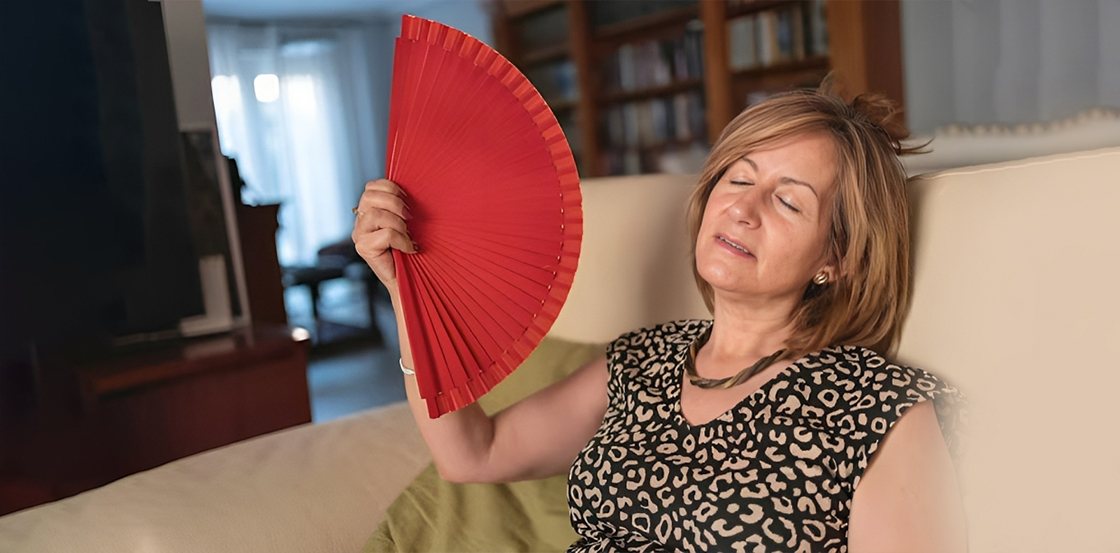Post link copied to clipboard!

Perimenopause symptoms, ever heard of it? It’s a phase that typically lasts around four years and kicks in during your mid to late 40s. But what’s it all about?
Well, in simple terms, perimenopause is like a rollercoaster for your menstrual cycle. Imagine having regular monthly cycles, and suddenly, they start playing tricks on you – shorter, longer, all over the place. It’s like a menstrual merry-go-round. And when you hit the 12-month mark with no periods, congratulations, you’re officially in menopause!
Now, here’s the scoop: every woman goes through perimenopause. It’s not a disease, not a condition, just a natural transition, much like puberty. Your body’s going through some changes as it ages, specifically your ovaries. They’re not as spry as they used to be and release fewer eggs as time goes by.
As for the perimenopause symptoms, they can range from wonky menstrual cycles to hot flushes, night sweats, mood swings, fatigue, insomnia, and even vaginal dryness. It’s a real bundle of joy, isn’t it?
Checking if you’re in perimenopause depends on whether you’ve got a uterus or not. If you do, your menstrual cycle is your marker. But for those without a uterus due to a hysterectomy or other treatments, it’s a blood test to the rescue.
Now, let’s talk about those infamous hot flushes. Some women breeze through them – mild, infrequent, not a big deal. Others, not so lucky. Intense, frequent flushes that mess with your sleep and daily life. What can you do? Well, there are a few options.
You could go the medication route, like SSRIs, or try non-medication approaches, such as changing your wardrobe to lighter, layered clothing, using fans, or exploring over-the-counter remedies like soy, acupuncture, hypnosis, or cognitive-behavioral therapy.
Hormone therapy is a potent option, but it’s not for everyone. It’s effective but should be used cautiously and for a limited time, usually less than five years.
Another medication that might surprise you is an antidepressant, not for depression but because serotonin has some magical effects on brain changes during this time.
So, most women know about menopause – no periods for a year, and you’re there. But perimenopause? It’s like a grey area, with no set timeframe, and no clear definition. It’s all about hormonal fluctuations.
As your ovaries wave the white flag, your body experiences various symptoms, causing confusion. Is it a disease? Normal? Just aging? The first signs usually involve your menstrual cycle acting up – shorter, lighter, or the opposite.
Next up, the dreaded hot flushes and night sweats. They can be all over the map, leaving you wondering if you’re normal. It’s because your ovaries are still making hormones like estrogen and progesterone, thickening your uterine lining, even when pregnancy isn’t on the horizon.
If you’re concerned about these changes, don’t hesitate to seek evaluation, especially if your bleeding gets heavier or lasts longer. Gynecologists will check for conditions like endometrial polyps, fibroids, or hypothyroidism, which can also mess with your cycle.
Mood swings and increased anxiety or depression are also common – up to 40% of women experience them during perimenopause. Remember, you don’t have to suffer in silence. Speak up and seek help.
So, what are your options if your menstrual cycle is all over the place? It depends on your most bothersome symptoms. If it’s the periods that are driving you bonkers, there are hormonal birth control methods to consider.
For those who prefer non-hormonal solutions, minor surgical procedures like endometrial ablation or uterine artery embolization can help. The key message here is that you have options. You don’t have to grin and bear it.
The journey through perimenopause isn’t the same for every woman. It can last anywhere from a few years to well over half a decade. So, if you’re experiencing perimenopause symptoms, it’s wise to consult a healthcare practitioner.
Oh, and let’s not forget about weight gain. It’s a common sidekick to hormonal fluctuations during this time. Don’t dismiss it as part of aging; discuss it with your healthcare provider. They can help you make lifestyle changes to maintain a healthy weight and avoid related health issues.
In a nutshell, perimenopause is a bumpy ride, but it’s about thriving, not just surviving. Seek help when needed, and remember, it’s all part of the unpredictable journey of womanhood.